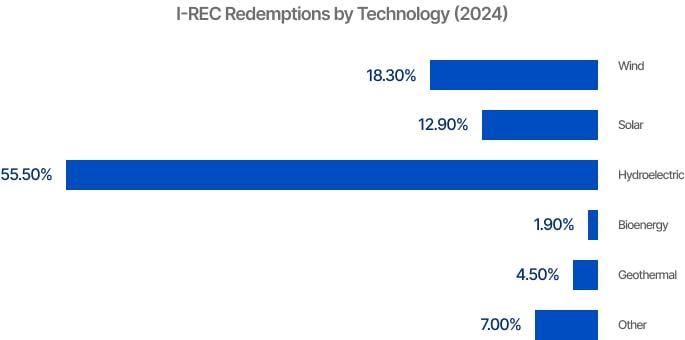I-REC Fuel Type Guide

The I-REC system recognizes a range of renewable energy sources, each with its own characteristics and environmental implications. Every I-REC certificate includes the associated fuel type, allowing buyers to make informed procurement decisions based on sustainability goals and environmental reporting requirements.

Source: Evident
I-REC Eligible Technologies
Solar
Electricity or thermal energy generated from solar radiation, typically using photovoltaic (PV) panels or concentrated solar power (CSP) systems. Solar is a non-dispatchable, zero-emissions technology widely used across both utility-scale and distributed generation projects.
Hydro-electric
Electricity produced by harnessing the kinetic energy of moving water, usually via dam-based or run-of-river hydro systems. Hydro is a mature and widely adopted renewable technology, with varying environmental impacts depending on scale and location.
Wind
Electricity generated by wind turbines that convert the kinetic energy of wind into mechanical power. Wind energy is scalable and emissions-free, with large-scale onshore and offshore installations playing a growing role in global energy systems.
Geothermal
Energy derived from the Earth's internal heat, accessed through wells and used for electricity generation or direct heating. Geothermal provides a stable, baseload renewable energy source with low lifecycle emissions.
Bioenergy
Bioenergy includes two primary categories: biomass and biogas, both derived from organic material.
Biomass: Solid or liquid organic matter—such as wood, agricultural residues, or waste—that is combusted or converted to produce electricity or heat. Biomass projects must comply with sustainability criteria to avoid competition with food sources or land use conflicts.
Biogas: A combustible gas generated through anaerobic digestion of organic waste. Biogas can be used for electricity generation, space heating, or upgraded to biomethane for use as a transport fuel or grid injection.
Why Fuel Type Matters
The fuel type associated with each I-REC is a key attribute used in emissions accounting, voluntary claims, and compliance with frameworks such as CDP, RE100, or national sustainability standards.
Take Control of Your Emissions
and Sustainability Strategy Today!
Request DemoSummary
Introduction
I-REC Eligible Technologies
Why Fuel Type Matters


